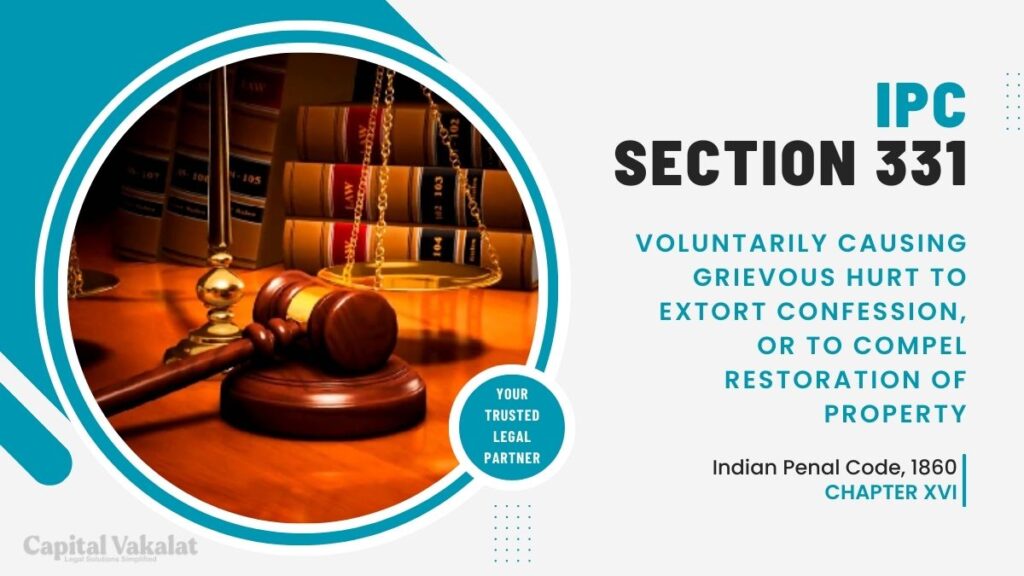Section 331 of the Indian Penal Code (IPC) holds a unique position in the legal landscape, addressing the gravity of voluntarily causing grievous hurt with the intent to extort confessions or compel the restoration of property.

This section plays a crucial role in maintaining law and order, ensuring justice is served in a fair and equitable manner.
Understanding Voluntarily Causing Grievous Hurt
In legal terms, grievous hurt encompasses severe injuries that pose a threat to life or cause intense physical pain. Section 331 focuses on instances where such harm is inflicted intentionally. It delves into the complexities of voluntary actions leading to grievous hurt, emphasizing the gravity of the offense.
Extortion and Confession in Legal Terms
To comprehend Section 331 fully, it’s essential to define extortion within the legal context. Extortion involves obtaining something, such as confessions, through force or threats. This section addresses the misuse of grievous hurt as a means to extract confessions, highlighting the severe consequences for such actions.
Compelling Restoration of Property
Beyond confessions, Section 331 also pertains to cases where grievous hurt is used to compel the restoration of property. This adds a layer of complexity, especially in property disputes, where the line between justice and coercion may blur.
Legal Consequences of Violating Section 331 IPC
The legal ramifications for violating Section 331 are significant. Offenders can face severe penalties and punishments, depending on the circumstances of the case. Examining legal precedents provides insights into how the courts interpret and apply this section in different situations.
Critiques and Controversies Surrounding Section 331
While Section 331 serves a vital purpose in the legal system, it is not immune to criticism. Some argue that the severity of the section may lead to potential misuse or misinterpretation. Exploring these critiques sheds light on the ongoing debate surrounding the application of this law.
Historical Context of Section 331 IPC
Understanding the historical evolution of Section 331 provides valuable context. Originating from a specific legal need, this section has undergone changes and amendments over the years, reflecting the evolving nature of the legal system.
Comparative Analysis with International Laws
A comparative analysis with international legal systems offers insights into how other jurisdictions address offenses similar to those covered by Section 331 IPC. Examining global perspectives provides a broader understanding of the role of grievous hurt in extracting confessions.
Landmark Cases Under Section 331 IPC
Highlighting landmark cases where Section 331 played a pivotal role showcases its real-world impact. These cases serve as legal benchmarks, shaping the interpretation and application of the law in different scenarios.
Conclusion
In conclusion, Section 331 IPC stands as a pillar in the legal framework, addressing the severe implications of voluntarily causing grievous hurt for ulterior motives. While critiques exist, its historical context, legal consequences, and landmark cases emphasize its importance in maintaining justice and order.
Frequently Asked Questions
How has the interpretation of Section 331 evolved over time?
The interpretation of Section 331 has evolved through legal precedents, adapting to societal changes and legal developments.
Are there defenses against charges under Section 331?
Legal defenses may exist, depending on the circumstances. Consultation with legal experts is crucial for a comprehensive understanding.
What role does intent play in cases under Section 331?
Intent is a critical factor in cases under Section 331, as the voluntary nature of the actions is a key element in determining guilt.
Can Section 331 be invoked in civil cases involving property disputes?
Yes, Section 331 can be applicable in civil cases where grievous hurt is used to compel the restoration of property.